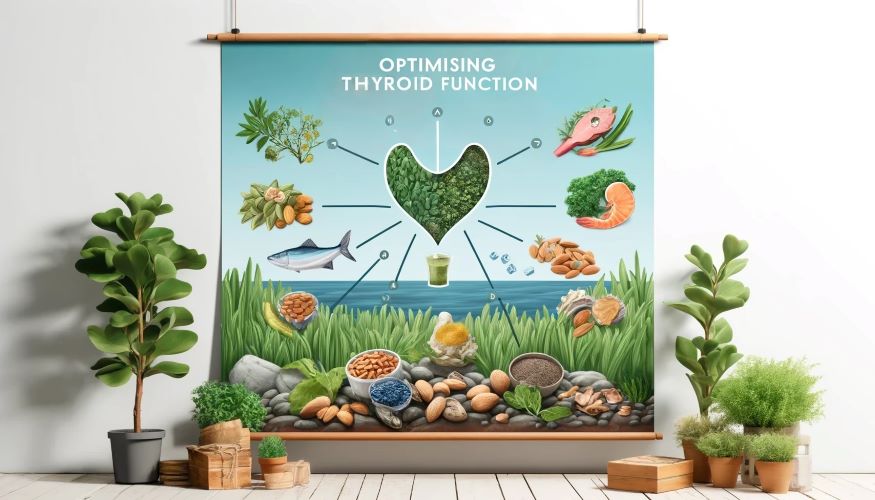7 Essential Vitamins, Minerals, and Herbs to Optimise Thyroid Function
Our thyroid gland is one of the most critical organs in our body, controlling metabolism, energy levels, and hormonal balance. It can affect everything from mood and weight to overall energy when it doesn't function properly. But what can we do to support our thyroid naturally and keep it performing at its best?
As we formulated the best combination for the Thyro complex, my medical team and I did a deep dive into the literature. We are happy to share our findings to help you understand the importance of certain trace elements, vitamins, and minerals. If you are deficient in any of these products, it may give you insight into why your thyroid function has been affected. Getting to the root cause is ideal for managing issues rather than simply medicating with thyroxine.
1. Iodine: The Foundation of Thyroid Hormones
Iodine (1) is an essential mineral our thyroid gland uses to produce thyroid hormones: triiodothyronine (T3) and thyroxine (T4).
A key finding is that due to the difficulty in measuring iodine levels from a blood test, deficiency is often missed until it is too late. I don't measure this in practice as you need to do a challenge test and collect urine, I just urge patients to optimise their levels in their diet.
In fact, low iodine is the most common deficiency found in vegans and easilyremedied by cooking with iodised salt.
- Why It’s Important: The thyroid gland stores and utilises iodine to create the hormones that regulate metabolism. Without adequate iodine, thyroid hormone production drops, leading to symptoms like fatigue, weight gain, and cognitive difficulties.
- Fact: Over 70% of the body's iodine is concentrated in the thyroid gland. Historically, iodine deficiency has been a leading cause of hypothyroidism, which is why the introduction of iodised salt had such a significant impact on public health.
- Seaweed (Kelp, Nori, Wakame): One of the richest natural sources of iodine, seaweed provides a substantial amount to help maintain thyroid hormone production.
- Iodised Salt: A practical and widespread way to prevent iodine deficiency.
2. Selenium: The Thyroid’s Protector
Selenium (2,3) is another deficiency that is likely underdiagnosed. Soil erosion has led to much lower levels in our food, affecting our dietary intake, and it is rarely measured. It is also helpful for boosting glutathione levels and for prostate health.
It is crucial for converting T4 (the inactive form of thyroid hormone) into T3 (the active form). It also acts as a potent antioxidant, defending the thyroid from oxidative damage.
- Why It’s Important: The thyroid gland generates hydrogen peroxide as a byproduct of hormone production, and selenium-based enzymes help neutralise this potentially harmful compound. Selenium also plays a role in reducing thyroid antibodies in autoimmune thyroid conditions.
- Scientific Insight: Studies have demonstrated that selenium supplementation can lower thyroid peroxidase (TPO) antibodies, especially in people with Hashimoto’s autoimmune thyroiditis.
- Brazil Nuts: Just one or two Brazil nuts a day can provide your entire daily requirement of selenium.
- Seafood (Tuna, Sardines, Shrimp): Seafood contains high levels of selenium, supporting thyroid function and protecting against oxidative stress.
3. Vitamin D3: Immune Modulator and Thyroid Supporter
Vitamin D3 (4), which is actually a prohormone, is strongly linked with energy production. Usually associated with bone health, it is also a critical player in immune function and inflammation regulation. Vitamin D receptors are present in thyroid cells, highlighting its importance for thyroid health.
- Why It’s Important: Vitamin D deficiency has been linked to autoimmune thyroid conditions like Hashimoto’s and Graves’ disease. Adequate levels of vitamin D3 may help modulate the immune system and reduce the risk of thyroid-related inflammation.
- Fact: Low vitamin D levels are surprisingly common, especially in areas with limited sunlight, making supplementation a crucial consideration for those with thyroid imbalances.
4. Magnesium: T4-T3 conversion
Magnesium (5) is difficult to measure from the blood as 99% is in the tissues and the body buffers magnesium levels.
If there was one mineral I would recommend everyone take over the age of 35 it is magnesium.
Even red blood cell magnesium does not correlate well with true levels. It is a mineral involved in more than 300 biochemical reactions in the body, including those necessary for thyroid function and hormone conversion.
- Why It’s Important: Magnesium is required for the enzyme that converts T4 into T3. It also helps manage the body’s stress response, which is vital since chronic stress can worsen thyroid function.
- Fascinating Fact: Magnesium also supports muscle and nerve health, which is often compromised in individuals with hypothyroidism.
- Leafy Greens (Spinach, Swiss Chard): These greens are rich in magnesium and support enzyme function crucial for thyroid hormone conversion.
- Nuts and Seeds (Almonds, Pumpkin Seeds): High in magnesium, these make for a healthy snack to help maintain optimal thyroid function.
5. Zinc: Essential for Hormone Synthesis and Immune Health
Zinc (6) is another crucial mineral influencing thyroid hormone production and supporting immune function.
- Why It’s Important: Zinc helps synthesise thyroid hormones and ensures the thyroid hormone receptors function correctly.
- Scientific Insight: Research shows that even mild zinc deficiency can impair thyroid function and reduce the levels of T3 and T4.
- Shellfish (Oysters, Crab): Oysters are one of the best sources of zinc, vital for thyroid hormone synthesis and immune function.
- Legumes (Chickpeas, Lentils): These plant-based options are rich in zinc, making them suitable for vegetarians and those looking to boost thyroid health.
6. Vitamin B12: Energy and Neurological Health deficiency caused by hypothyroidism
Vitamin B12 is a key nutrient that supports energy metabolism and nervous system health. Deficiencies in B12 are common among those with thyroid dysfunction, particularly hypothyroidism.
- Why It’s Important: Hypothyroidism often causes poor absorption of vitamin B12, contributing to fatigue, brain fog, and neurological issues. Supplementing with B12 can help mitigate these symptoms and improve overall energy levels.
- Fascinating Fact: Up to 40% of people with thyroid disorders may have a B12 deficiency, making it essential to monitor and address.
- Animal Liver (Beef, Chicken): Organ meats are incredibly rich in vitamin B12, essential for energy metabolism and nervous system health.
- Fortified Foods (Plant-Based Milk, Nutritional Yeast): For those following a vegan diet, fortified foods provide a practical source of vitamin B12.
7. Ashwagandha: Adaptogen and peripheral tissue conversion to T4 to T3
Ashwagandha (7) is a well-known adaptogenic herb that helps the body cope with stress and balance hormone levels, including thyroid hormones. High cortisol suppresses both the production of sex hormones and thyroid production.
- Why It’s Important: Chronic stress can wreak havoc on the thyroid by elevating cortisol levels, which can suppress thyroid hormone production. Ashwagandha helps modulate the hypothalamic-pituitary-thyroid (HPT) axis, improving overall thyroid balance.
- Scientific Insight: Clinical studies have shown that Ashwagandha can increase T3 and T4 levels.
- Powdered Ashwagandha Root: This can be added to smoothies or tea, offering stress relief and benefits for thyroid hormone regulation.
- Ashwagandha Capsules: A convenient supplement widely used for balancing cortisol levels and supporting thyroid health.
Conclusion
Optimising thyroid function is about more than just taking one or two supplements. It requires a holistic approach that includes essential vitamins, minerals, and adaptogenic herbs to support hormone synthesis, immune function, and stress management. Whether you're dealing with hypothyroidism, autoimmune thyroiditis, or simply looking to maintain thyroid health, these nutrients can make a significant difference.
There is also a very strong link between gut health and thyroid function. When patients with thyroid autoimmune disease, inflammatory bowel disease, SIBO, and other gut issues are corrected, their antibody levels can reverse. The presence of LPS antibodies in the bloodstream indicates a leaky gut.
Thyro complex, for thyroid support.
Dr Geoff Mullan
Functional Medicine Doctor
References
- Iodine Deficiency Disorders and Their Elimination
- Huwiler VV, Maissen-Abgottspon S, Stanga Z, Mühlebach S, Trepp R, Bally L, Bano A. Selenium Supplementation in Patients with Hashimoto Thyroiditis: A Systematic Review and Meta-Analysis of Randomized Clinical Trials. Thyroid. 2024 Mar;34(3):295-313. doi: 10.1089/thy.2023.0556. Epub 2024 Feb 16. PMID: 38243784; PMCID: PMC10951571.
- Wang F, Li C, Li S, Cui L, Zhao J, Liao L. Selenium and thyroid diseases. Front Endocrinol (Lausanne). 2023 Mar 24;14:1133000. doi: 10.3389/fendo.2023.1133000. PMID: 37033262; PMCID: PMC10080082.
- SYSTEMATIC REVIEW Wang J, Lv S, Chen G, Gao C, He J, Zhong H, Xu Y. Meta-analysis of the association between vitamin D and autoimmune thyroid disease. Nutrients. 2015 Apr 3;7(4):2485-98. doi: 10.3390/nu7042485. PMID: 25854833; PMCID: PMC4425156.
- Wang K, Wei H, Zhang W, Li Z, Ding L, Yu T, Tan L, Liu Y, Liu T, Wang H, Fan Y, Zhang P, Shan Z, Zhu M. Severely low serum magnesium is associated with increased risks of positive anti-thyroglobulin antibody and hypothyroidism: A cross-sectional study. Sci Rep. 2018 Jul 2;8(1):9904. doi: 10.1038/s41598-018-28362-5. PMID: 29967483; PMCID: PMC6028657.
- Zhou Q, Xue S, Zhang L, Chen G. Trace elements and the thyroid. Front Endocrinol (Lausanne). 2022 Oct 24;13:904889. doi: 10.3389/fendo.2022.904889. PMID: 36353227; PMCID: PMC9637662.
- Ganapathy S, Volpe SL. Zinc, exercise, and thyroid hormone function. Crit Rev Food Sci Nutr. 1999 Jul;39(4):369-90. doi: 10.1080/10408699991279213. PMID: 10442272.
- Sharma AK, Basu I, Singh S. Efficacy and Safety of Ashwagandha Root Extract in Subclinical Hypothyroid Patients: A Double-Blind, Randomized Placebo-Controlled Trial. J Altern Complement Med. 2018 Mar;24(3):243-248. doi: 10.1089/acm.2017.0183. Epub 2017 Aug 22. PMID: 28829155.
- Yang X, Chen L, Zhao L, Yang Y, Wang J, Yan L, Tai G, Zhang H. Cordyceps sinensis-derived fungus Isaria felina ameliorates experimental autoimmune thyroiditis in mice. Biomed Pharmacother. 2021 Aug;140:111733. doi: 10.1016/j.biopha.2021.111733. Epub 2021 May 21. PMID: 34029950.






